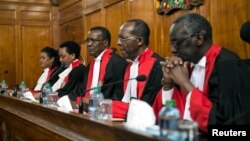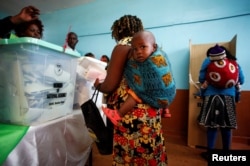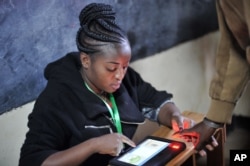The roads around Kenya’s Supreme Court were cordoned off Wednesday, and police dispersed protesters from the ruling and opposition parties who had gathered outside.
Inside, justices spent more than seven hours explaining why they decided that results of the country’s August 8 presidential election would be nullified, putting much of the blame upon the country’s electoral commission, known as the IEBC.
Justice Philomena Mwilu was one of three justices to explain why she voted in favor of the petition, filed by Raila Odinga’s opposition coalition, which challenged incumbent President Uhuru Kenyatta’s win.
“We find that the 2017 presidential election was not conducted in accordance with the principles laid down in the constitution and the written law on elections ... in that it was neither transparent nor verifiable. On that ground alone and on the basis of the interpretation we have given to Section 83 of the Elections Act, we have no choice but to nullify it,” said Mwilu.
Mwilu said the IEBC refused a court order demanding it open its computer servers. As a result, she said, justices had no choice but "to accept the petitioner’s claims that the IEBC’s IT system was infiltrated and compromised and the data therein interfered with, or IEBC’s officials themselves interfered with the data or simply refused to accept that it had bungled the whole transmission system and were unable to verify the data."
In Kenya’s electoral system, official tally forms were to be sent from all 291 constituencies and 40,883 polling stations to the national tallying center. These paper forms were to back up the electronic tally that was also sent to the center.
The justices took issue with the fact that the IEBC announced official results before about a quarter of these paper forms had been received.
In his comments, Chief Justice David Maraga said many of the constituency level forms were incomplete, often lacking required signatures or IEBC features.
“As we have noted, out of 291 forms, 56 from that random sample, no, no, 56 did not have the watermark features, while one did not bear the serial numbers, and a further five were not signed at all,” said Maraga. “And two were only stamped by the returning officers, but not signed. In addition, two forms were not signed by the agents.”
According to Nairobi-based writer and political analyst Nanjala Nyabola, these procedures are important because they were put into place due to other electoral crises over the years. And, she says, the judges understand these implications.
“They are not merely technicalities but they are things that are protected and enshrined in law,” said Nyabola. “They [justices] were saying to the IEBC, you do not get to pick and choose which parts of the law you obey because if we allow you to do that, what is to stop the next commission, the next individual, the next institution from doing the same thing?”
The IEBC announced that a meeting scheduled Wednesday with officials from the Jubilee ruling party and NASA opposition coalition would be postponed to a later date to allow the parties to consider the court’s judgment and “inform discussions on preparations for fresh polls.”
Currently, the re-run election is scheduled for October 17, but the opposition is pushing for a later date. The constitution dictates the poll take place within 60 days of the Supreme Court's ruling, which is October 31.


